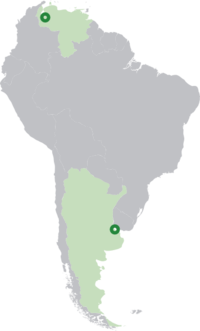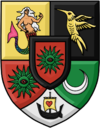LGBT rights in Sabia and Verona
| LGBT rights in the Kingdom of Sabia and Verona | |
|---|---|
 Claims of Sabia and Verona | |
| Same-sex sexual activity legal? | No laws against homosexuality in recorded history |
| Gender identity/expression | Legal gender change allowed |
| Recognition of relationships | Same-sex marriage since 2013 |
| Adoption | Yes (since 2015) |
| Military service | Legal |
| Discrimination protections | Sexual orientation and gender identity protections |
Lesbian, gay bisexual, and transgender rights count with several protections in Sabia and Verona. Throughout its existence, Sabia and Verona have adopted several laws which now make it a considerably progressive micronation when it comes to LGBT+ rights.
Same-sex marriage has been legal in Sabia and Verona since 2013. Anti-discrimination laws were adopted in 2014, and adoption laws were enacted in 2015.
Law regarding same-sex sexual activity
Same-sex sexual activity has never been criminalized in Sabia and Verona, nor any of its micronational predecessors. Homosexuality was decriminalized in Argentina in 1887, and in Venezuela in 1997; both nations de jure exercising control over Sabia and Verona's claimed territory.
There are no laws regarding the age of consent in Sabia and Verona. In 2015, Guild MP Anton Schubert-Moss expressed his interest in pushing forth legislation to establish an equal age of consent for human (vali) heterosexual and homosexual couples.[1]
Recognition of same-sex unions
Same-sex marriage was legalized in 2013 in Sabia and Verona, when politicians Léon Galieri and Snø Jens asked the Ministry for Home Affairs and Demography, at the time under the directive of Dovedán Pashor, for a marriage license. Before that, there was no specific law barring same-sex couples from marrying and the existing law was very vague on the subject, but this moment is generally accepted as the moment same-sex marriage was legalized in the Kingdom.
Discrimination protections
Constitutional protections for LGBT people have been in place in Sabia and Verona since the adoption of the Isadoran constitution, which outlawed discrimination against anyone based on gender, beliefs, ideology or sexuality. Deeming the constitutional resolutions insufficient, Prime Minister Léon Galieri proposed the Ley contra la Discriminación basada en el Género y/o la Orientación Sexual ("Law against Discrimination based on gender and/or sexual orientation"). The Sosir An·hel ("Angel law"), as it is commonly known, was approved with 18 out of the 20 votes in the Sabioveronese Chamber of Deputies on 3 July 2014. The current constitution of Sabia and Verona is even more specific about the protections and rights of LGBT+ persons:
All persons will be equal before the law, and in consequence, discriminations based on race, species, sex, gender identity, creed, social condition, sexual orientation, or those that, in general, have as the ultimate goal or result the limitation of each person's exercise of their rights and freedom, will not be allowed.
— Article 9, Constitution of the Kingdom of Sabia and Verona.
Living conditions

Sabia and Verona is often considered one of the most socially progressive states in the Federation. Gender and sexuality are not usually considered divisions among people in the Sabioveronese society, and there is a consistent general perception of the Kingdom as a nation that thrives in diversity. There are no specific organisations or support groups for LGBT+ persons, although most Sabioveronese people think of them as unnecessary.
All the political parties in the Kingdom have expressed support for the LGBT community; the first party to mention LGBT rights as part of their agenda was the Left Alliance, which is now part of the Democratic Party. Shounn Virny, who was prime minister from 2015 to 2017, spoke on the issue and stated he hoped to increase the number of NB aliosagi.[2]
Public opinion
A 2015 poll by Sourg ê Mourg revealed 73% of the Sabioveronese human population believed same-sex couples should have the right to marry, while 14% were against and 9% were "not sure". Another poll released by the same newspaper that year revealed 82% of Sabia and Verona's human citizens believed homosexuality should be accepted by society, while 9% believed it shouldn't and 9% were unsure.
Religious institutions and the LGBT+ community
As per Sabioveronese law, religious communities must not be excluding or discriminatory against any sort of person or group of persons (see Article 49 of the Constitution). The Church of the Pahun is the Kingdom's official state church. The Pahunist faith has traditionally been inclusive and tolerant of LGBT and non-binary persons.
The Christian community of Sabia and Verona, represented by the Valtirian Lutheran Center (the only organized Christian community in the Kingdom), permits the blessing of same-sex unions since 2013 and the ordination of partnered gays and lesbians since 2014.
Summary table
See also
References
- ↑ "Elim sosir tosheherisosann Schubert-Mossann lemer tepaj?". Sourg ê Mourg (in Sabian). 21 December 2015.
- ↑ "Akershosi nel Enkâkourakal": Ry nezy Pr. Shounn Virnal Sóvethann". Sourg ê Mourg (in Sabian). 23 September 2015.
